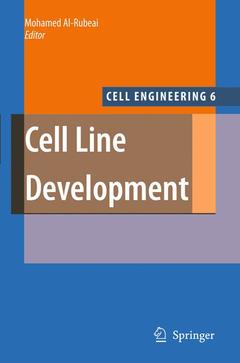Description
Cell Line Development, 2009
Cell Engineering Series, Vol. 6
Coordinator: Al-Rubeai Mohamed
Language: English
Subjects for Cell Line Development:
Keywords
Activation; CMV; Expression; RNA; biotechnology; gene expression; methodology; protein; proteins; transgen; translation; genetic engineering
253 p. · 15.5x23.5 cm · Paperback
Description
/li>Contents
/li>Comment
/li>
Mammalian cell lines command an effective monopoly for the production of therapeutic proteins that require post-translational modifications. This unique advantage outweighs the costs associated with mammalian cell culture, which are far grater in terms of development time and manufacturing when compared to microbial culture. The development of cell lines has undergone several advances over the years, essentially to meet the requirement to cut the time and costs associated with using such a complex hosts as production platforms.
This book provides a comprehensive guide to the methodology involved in the development of cell lines and the cell engineering approach that can be employed to enhance productivity, improve cell function, glycosylation and secretion and control apoptosis. It presents an overall picture of the current topics central to expression engineering including such topics as epigenetics and the use of technologies to overcome positional dependent inactivation, the use of promoter and enhancer sequences for expression of various transgenes, site directed engineering of defined chromosomal sites, and examination of the role of eukaryotic nucleus as the controller of expression of genes that are introduced for production of a desired product. It includes a review of selection methods for high producers and an application developed by a major biopharmaceutical industry to expedite the cell line development process. The potential of cell engineering approch to enhance cell lines through the manipulation of single genes that play important roles in key metabolic and regulatory pathways is also explored throughout.
These books may interest you

Cell Line Development 158.24 €



